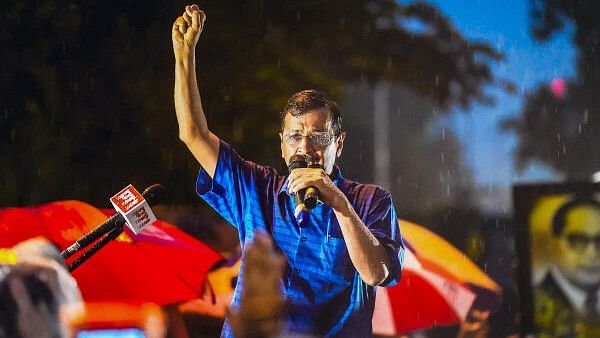
Arvind Kejriwal addresses supporters after his release.
PTI
The grant of bail for Delhi Chief Minister Arvind Kejriwal in the liquor policy case instituted by the CBI comes as no surprise, but Kejriwal’s resignation in its wake is a surprise. The Supreme Court’s decision was expected because it had granted bail to him and others, including his deputy Manish Sisodia, in the PMLA case. Kejriwal has now announced that he will resign as chief minister. He has sought advancement of Assembly elections to November. He says he will return to power “only after the people send me to the seat again.”
That gives him some political leeway, and a chance to turn the liquor case into an electoral plank. It is also a response to the tough bail conditions imposed by the court. It would have been difficult for him to effectively function as chief minister since he was barred from going to his office and allowed to sign only some files, as stipulated in the bail judgement. The conditions would have constrained his rights and responsibilities as a chief minister. Kejriwal has sought to make a political opportunity of the bail and its unusual conditions. The question of whether an electoral victory will trump a case or court ruling will remain, but some politicians seek risky answers to questions.
The grant of bail and the court’s pronouncements in the case were in fact more about the CBI, which arrested Kejriwal, than about the bail that he had sought. The two-judge bench of Justice Surya Kant and Justice Ujjal Bhuyan rightly reiterated, as in earlier orders, that prolonged incarceration violates the right to liberty, especially because the trial is unlikely to be completed soon. While again underlining the principle that bail is the norm and jail the exception, the court reasserted the value of the right to liberty under Article 21 and warned against the process becoming the punishment.
The judgement also stands out for the questions posed by Justice Bhuyan about the CBI’s conduct, and the very need for Kejriwal’s arrest. While Justice Surya Kant did not question the arrest, Justice Bhuyan severely indicted the CBI, invoking again the court’s 2013 description of the agency as a ‘caged parrot’ and urging it to be above board in its actions. He said that Kejriwal’s arrest, when he was about to be released on the orders of the court in the PMLA case, was suspect and intended to “frustrate” his release. This meant that the court thought the arrest was effected at the behest of the government to serve its political interests. The judgement is a legal victory for Kejriwal, and he is trying to make it a political victory.